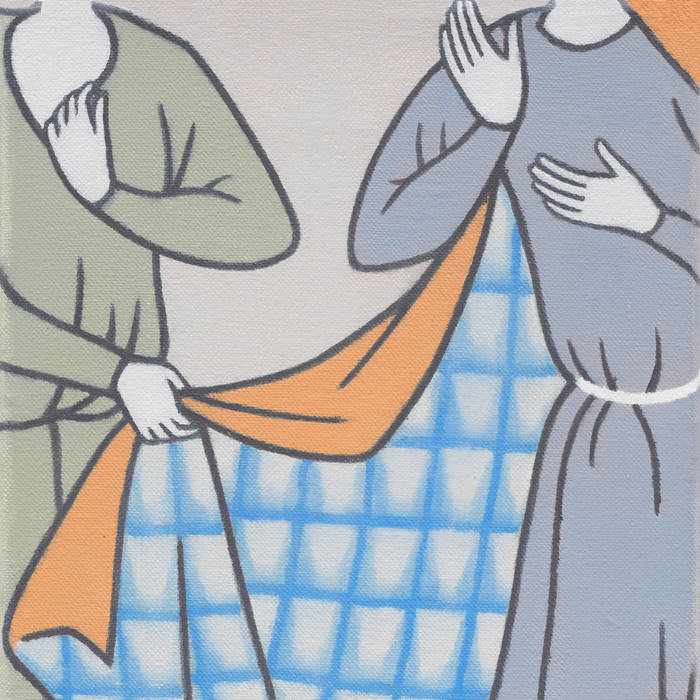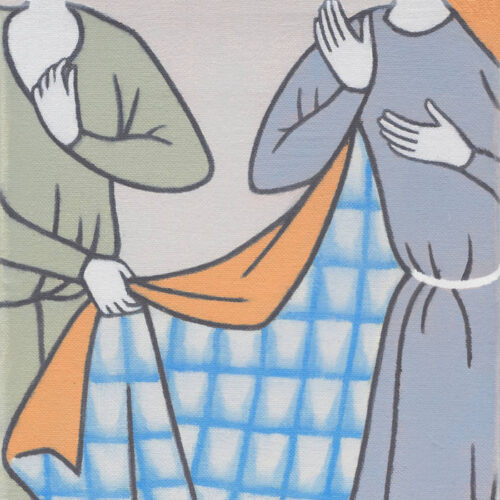In 2022, I attended Tarta Relena’s Le Guess Who concert at Janskerk in Utrecht. Although most of the seats were taken, I managed to find a free one at the front. I believe being close to the artists made the experience different from being at the back. The polyphonic singing by Helena Ros and Marta Torrella took me on a journey through time and space, enhanced by the acoustics of the century-old sacred venue. Their performance circled the Mediterranean Sea, delving into its traditions and histories. A vase stood between the two vocalists and their electronics, symbolising the mythology that Tarta Relena embody.
Three years after the release of their second album Fiat Lux, Tarta Relena return with new one, És pregunta, a mesmerising blend of traditional and modern elements. Inspired by texts and stories from the Mediterranean, the album revolves around the two voices – a soprano and a contralto – which exude a sacred quality. Their repetitions and polyphonic interweaving are reminiscent of the siren’s call. Tarta Relena could sing a capella, and it would already have a power in it. Choral music provides the key to the record. When electronic sounds appear, they sound as if they are coming from the background, as an ornament played from the other room. But that doesn’t mean it doesn’t matter because the Catalonian band’s new album brings these elements to a new level.
The duo draws inspiration from Mediterranean authors to create original texts in various languages, such as Greek, Italian, Ladino, Sephardic, Catalonian, and Spanish. They are out of the English-language world, making getting lost in these languages possible – it requires careful attention to fully appreciate the depth of their storytelling. They cut words, repeat fragments of them, loop phrases, modulate the timbre of the voices, making a polyphonic sound of languages, and one time, they sing in reversed language. They create new variations in a Dadaist manner, situationist juxtapositions, or trying to do with old poems and new music ideas that the French Oulipo group seeks to create works using constrained writing techniques.
Adding the electronics brings this “choral” music up-to-date. Sometimes delicate and subtle in the background, occasionally disturbing. In ‘Si veriash a la rana’ or ‘Mano décima’, they weave rhythmic percussions, beats, and breakbeats most strongly, but more interesting are the non-obvious moments, when, on the border between silence and anxiety, they modulate the voice, emotions, and overtones of the music with ornaments that boost the elements of the most important thing: the voice. They make use of autotune in ‘Tamarindo’, making their voices sound archaic and futuristic at the same time. ‘Galenismós’, a track inspired by Homer’s Odyssey, was composed by sonifying water temperature data from the depths of Mediterranean. Sometimes, there are just voices and some sound after images, which works well, too.
However, the most striking part of the album is the final song, ‘Crit premonitory’. It was the first track to be composed for this album and features repeated verses and haunting melodies that build an atmosphere of impending doom. The duo almost whispers into your ear but their voices grow louder as the apocalypse approaches. You can hear them taking deep breaths to before they sing each phrase, repeating them along with a synth, heightening the sense of anxiety. This is Tarta Relena’s essence: they sound like soothsayers from the past, but how they dress up the traditionally inspired lyrics makes them sound thoroughly contemporary. Like linguists they juggle with words, manipulating the voice, creating a speculative storytelling of the past and the present all at once.



